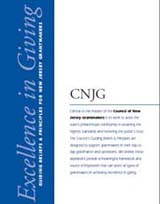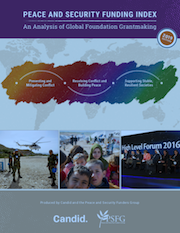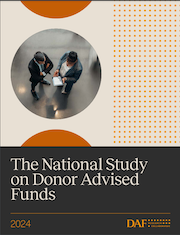Site Search
- resource provided by the Forum Network Knowledgebase.
Search Tip: Search with " " to find exact matches.

This includes insights and tips related to board governance, legal compliance, grantee communications, fiscal responsibility, public disclosure, and many other key areas of foundation governance and operations. It is intended to serve as a practical resource to assist foundations in their grantmaking.
Confounded by what to do and how to be in your role right now? What does it mean to be focused on a vision of racial equity, well-being, gender justice, economic health when people, institutions, and the systems that have allowed most of us to at least limp along are literally under attack?
With manufactured chaos causing increased threats and real impacts to our safety, our communities face even greater challenges in understanding how and where to strategically invest time, money, and energy. Part presentation and part experiential workshop, this mini-lab led by Change Elemental is designed to meet this moment by supporting us to move in complexity and chaos toward visions of a more just and safer future.
Participants will be invited to learn more about and/or deepen your practice of:
Advancing liberation and sovereignty
Sharing leadership and power
Valuing multiple ways of knowing
Creating space for inner work
Influencing complex systems change
Working with real-life examples, we will dive into what a future of liberation and sovereignty---a future that centers interdependent, whole people and whole communities---looks like and how we might be in support of nonprofits who are actively engaging in the strategies of blocking attacks, building power, cultivating belief, and bridging communities.
Whether you are an evaluator seeking to disrupt existing mental models for evaluating strategy or measuring impact or you're a program officer seeking ways to disrupt power dynamics and build meaningful partnership within the communities you serve, this experience will lead to specific actions for moving effectively with purpose in this moment.
What will I learn?
Session participants will leave with:
New frameworks and ideas for applying them to advance a liberatory future in complexity and chaos
A guiding question and tools to support ongoing experimentation
A taste of what practicing liberation and sovereignty can mean, be, and feel like
A call to support more spaces rooted in being in healthy, continuous, and mutually accountable relationship with self, each other, and the more than human world
Speakers
Aja Couchois Duncan, Senior Consultant, Change Elemental
Elissa Sloan Perry, Director, Prefiguring Futures, Change Elemental
Jess Solomon, Principal, Art in Praxis (former senior program officer, Robert W. Deutsch Foundation)
Trish Adobea Tchume, Vice President, Robert Sterling Clark Foundation
Who should attend?
All interested funders, regardless of roles. What to expect: presentation, practice, followed by panel discussion.
Cost: Free for CNJG Members
Presented by Philanthropy New York
The Council of New Jersey Grantmakers’ 2023 – 2027 Strategic Plan reimagines the future for CNJG. As a result of the extensive strategy development process, the plan includes a renewed vision, mission, core values, and goals. The work is informed by previous efforts, and current issues and trends impacting philanthropy and society.
The 2023 - 2027 Strategic Plan is a roadmap for the next five years, built upon CNJG's past strategic plans and learnings. We look forward to executing this plan, the additional learnings and opportunities it will bring, and delivering on these goals to move us into the future.
How the government can partner with impact investors to unleash new capital, talent and energy for maximum impact.
"Co-Creation" is a case study about the Connecticut Early Childhood Funder Collaborative, a project of the Connecticut Council for Philanthropy. The case study, written by Patricia Bowie, examines co-creation, an emerging systems change collaboration model which grew out of a funder-and-state partnership. This unique partnership led to the creation by executive order of a new and independent Office of Early Childhood, which was formally approved by the Connecticut State Legislature in 2013. The companion piece, "Taking on New Roles to Address 21st Century Problems," looks at co-creation from the perspective of a regional association of grantmakers.
The Connecticut Early Childhood Funder Collaborative comprises 14 funders from around the state who bring many years of experience in supporting and operating programs that serve the needs of children and families.

The latest edition of this study found global philanthropic support for efforts to prevent, mitigate and resolve conflicts totaled $328.2 million in 2016 from 326 foundations and 2,600 grants. Funding for peace and security remains insignificant relative to foundation funding overall, accounting for just 0.7 percent of the $32 billion given by foundations in Candid's 2016 FC 1000 data set.
Case study from Philanthropy New York documenting the formation, challenges and ultimate success of the Education Funders Research Initiative – an unusual funder collaborative that brought together funders for and against charter schools, funders with different views of testing and accountability, and funders with vastly different approaches to supporting education reform to identify and advance shared priorities.
Grantmaking at the Crossroads is a workbook designed to provide foundations with a new grantmaking methodology that works at the intersection of place, population, and issue. It offers a pathway to greater inclusion of communities that are often excluded or marginalized by foundation funding and enables foundations to maintain their focus and priorities while expanding their reach and effectiveness.
The Grand Rapids Community Foundation and the Kalamazoo Community Foundation volunteered to be laboratories for Grantmaking at the Crossroads and have been critical informants for this workbook. Each of these foundations holds an unwavering commitment to ongoing learning; this publication would not have happened without their support and engagement and the financial support of the Arcus Foundation.
These resources are from CNJG's 2016 Annual Meeting & Holiday Luncheon where the topic of shifting demographics was explored. Research by the Pew Research Center shows that New Jersey, and the nation, is experiencing the most striking social, racial, economic, and demographic shifts that have not been seen in more than a century. Funders will need to address the new challenges this “next America” will face, including an increasing aging population, greater racial tapestry, the influence of religion and technology, and more.
This paper explores community democracy as a cultural choice and a potential organizing system for philanthropy using stories that demonstrate its principles and practices, primarily growing from the experience of northern California communities. This experience offers a framework of principles and a beginning set of conclusions about how philanthropy can develop productive partnerships from the perspective of a place-based, community democracy.
What do the latest trends in family philanthropy tell us about effectiveness and impact?
Join us to dive into select findings from the Trends 2025 report. You will hear from family foundations about how these trends relate to their impact and effectiveness.
We’ll cover topics including relationships, accountability, and equity, and ask questions like:
- How are family relationships changing, especially when involving the next generation?
- How are funders being accountable to their communities? What perspectives are you including in your strategy and decision-making conversations?
- What changes have you implemented over the past five years, and what are you continuing to learn?
Cost: This event is free for CNJG Members who are family foundations.
Other types of foundations are ineligible to join this webinar.
This program is a CNJG membership benefit for family foundation members, including staff and trustees, in partnership with the National Center for Family Philanthropy.
Community foundations are beginning to deepen and shift how they work, adopting an anchor mission that seeks to fully deploy all resources to build community wealth. Moving into territory relatively uncharted for community foundations, they are taking up impact investing and economic development — some in advanced ways, others with small steps. This report offers an overview of how 30 representative community foundations — including The Seattle Foundation, the Vermont Community Foundation, and the Greater Cincinnati Foundation — are working toward adopting this new anchor mission.
This Democracy Collaborative report was written by Marjorie Kelly, Senior Fellow and Director of Special Projects and Violeta Duncan, Community Development Associate.

This project represents the most extensive independent study on DAFs to date.
Thanks to the collective efforts of 111 DAF programs that voluntarily provided anonymized data to the research team, the dataset covers nine years of activity from more than 50,000 accounts, with over 600,000 inbound contributions to DAFS and more than 2.25 million outbound grants from DAFs.
The DAFRC research team hopes this data will be used to improve best practices, inform relevant regulation, or enhance the field’s use of DAFs as a philanthropic tool for donors, DAF sponsoring organizations, and other sector partners.
The Manager of Research Operations (MRO), Policy Solutions, facilitates the smooth operation and financial success of the Policy Solutions Department. The department has 12 staff members in a variety of technical and managerial roles. This position requires a high degree of attention to detail, a strong sense of accountability, and a proactive orientation. The MRO is the primary departmental liaison with the Finance and Operations departments regarding contracts & invoicing and provides information & materials to the Communications & Marketing team as needed. The MRO monitors the department’s project pipeline and is responsible for the compilation and submission of complex project proposals.
Sample disaster preparedness and recovery plans for foundations.
